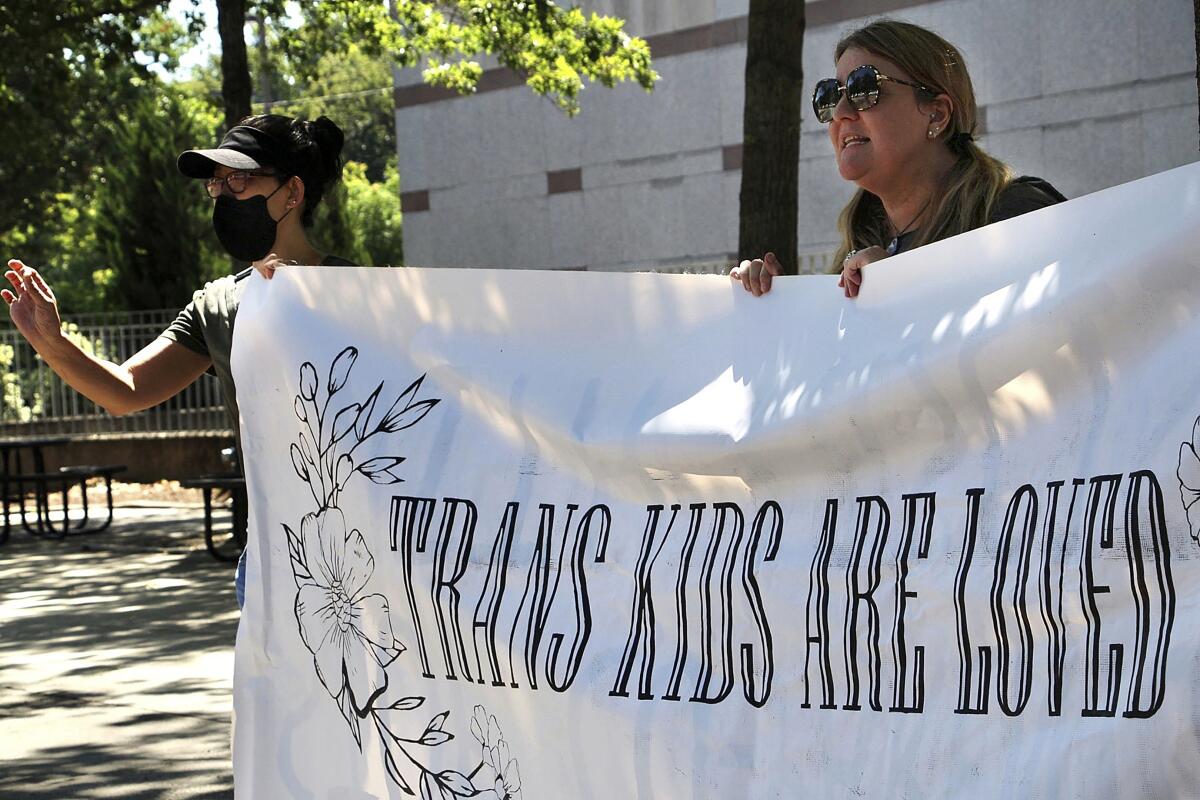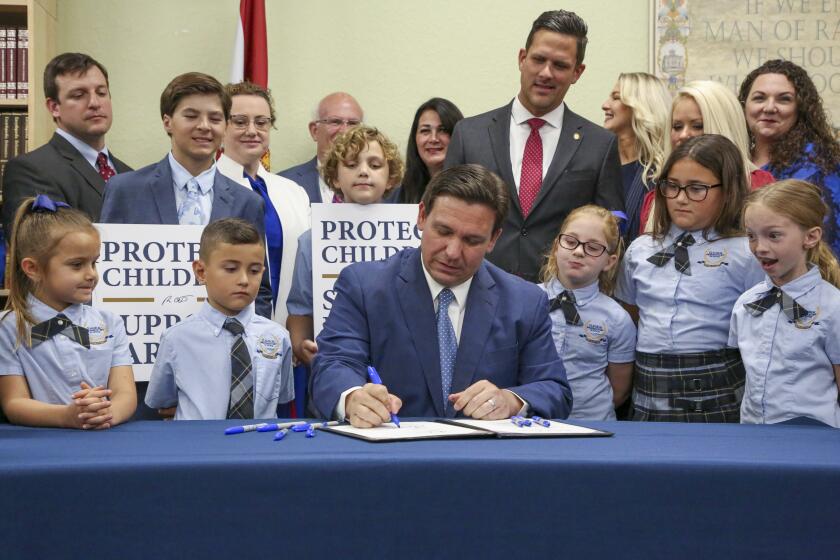Ban on gender-affirming care for minors takes effect in North Carolina after veto override

- Share via
RALEIGH, N.C. — Transgender youth in North Carolina lost access Wednesday to gender-affirming medical treatments after the Republican-led General Assembly overrode the governor’s vetoes of that legislation and other bills touching on gender in sports and LGBTQ+ instruction in the classroom.
GOP supermajorities in the House and Senate enacted — over Democratic Gov. Roy Cooper’s opposition — a bill barring medical professionals from providing hormone therapy, puberty-blocking drugs and surgical gender-transition procedures to anyone under 18, with limited exceptions.
The law takes effect immediately. But minors who began treatment before Aug. 1 may continue receiving such care if their doctors deem it medically necessary and their parents consent.
North Carolina becomes the 22nd state to enact legislation restricting or banning gender-affirming medical care for transgender minors. But most face legal challenges, and local LGBTQ+ rights advocates vow to take the North Carolina ban to court. The Senate voted 27-18 to complete the veto override after the House voted 74-45 earlier. Two House Democrats joined all present Republicans in supporting the override bid.
Democratic Sen. Lisa Grafstein, North Carolina’s only out LGBTQ+ state senator, said the gender-affirming care bill “may be the most heartbreaking bill in a truly heartbreaking session.”
Republican Sen. Joyce Krawiec, the bill’s primary sponsor, argued that the state had a responsibility to protect children from receiving potentially irreversible procedures before they are old enough to make their own informed medical decisions.
The push to restrict gender-affirming healthcare for transgender minors sets off a scramble among families trying to secure the care their kids need.
Gender-affirming care for youths is considered safe and medically necessary by the American Academy of Pediatrics, the American Medical Assn. and the Endocrine Society. While trans minors very rarely receive surgical interventions, they are commonly prescribed drugs to delay puberty and sometimes begin taking hormones before reaching adulthood.
Some LGBTQ+ rights advocates in the Senate gallery began yelling after Republican Lt. Gov. Mark Robinson, who was presiding, cut off Grafstein to let another lawmaker speak. Several people were then escorted out by police.
Earlier, the Senate and House voted minutes apart to override another veto of a bill limiting LGBTQ+ instruction in the early grades. The law now requires that public school teachers in most circumstances alert parents before they call a student by a different name or pronoun. It also bans instruction about gender identity and sexuality in kindergarten through fourth grade, which critics have previously likened to a Florida law that opponents call “Don’t Say Gay.”
Nathaniel Dibble, 19, and other LGBTQ+ youth who rallied outside the Legislative Building said the bill would make schools unsafe for transgender students who could be outed by a teacher to unsupportive parents.
The Board of Education approved a ban on classroom instruction about sexual orientation and gender identity in all grades.
But bill sponsor Sen. Amy Galey, an Alamance County Republican, said parents had a right to know details about their children’s education. “Parents need to be brought into the conversation from the very beginning, not treated with suspicion or as the source of that anguish,” she said.
Both chambers also voted Wednesday to override Cooper’s veto of a bill banning transgender girls from playing on girls’ sports teams from middle and high school through college. It, too, immediately became law.
A day of divisive deliberations saw anger and emotion boil over at times.
Democratic Rep. John Autry of Mecklenburg County, who has a transgender grandchild, choked up while debating the gender-affirming care bill on the House floor. “Just stop it,” he begged his Republican colleagues before they voted.
A new rule proposed by the Biden administration would prevent schools and colleges from enacting outright bans on transgender athletes.
Cooper blasted the two chambers for what he called “wrong priorities” even before lawmakers were done voting.
“The Legislature finally comes back to pass legislation that discriminates,” he said.
Parents of trans and nonbinary children said before the voting that they’ve been weighing whether to move their families out of North Carolina so that their children will have unrestricted access to gender-affirming healthcare.
Elizabeth Waugh’s nonbinary child did not begin receiving treatment before Aug. 1 and would need to travel elsewhere if they wanted to start taking hormones.
Start your day right
Sign up for Essential California for the L.A. Times biggest news, features and recommendations in your inbox six days a week.
You may occasionally receive promotional content from the Los Angeles Times.
“I have felt like I had a lump in my throat for months,” she said. “Just talking to other families who are dealing with this, I mean, the pain that they are feeling, the suffering, the fear for their children — it’s devastating.”
The House kicked off the day’s rush of votes with the athletics bill, and the Senate completed that override soon after.
A former Olympic swimmer, Rep. Marcia Morey, spoke about the possible emotional impact of the law on young athletes.
“This bill affects 10-, 11-, 12-year-olds who are just starting to learn about athletics, about competition, about sportsmanship,” said Morey, a Durham County Democrat. “To some of these kids, it could be their lifeline to self-confidence.”
England’s publicly funded health service says it will not routinely offer puberty-blocking drugs to children at gender identity clinics.
She and other critics said limits on transgender participation were discriminatory and would unfairly exclude a small number of students.
But recent high school graduate Payton McNabb said she was living proof that the law was needed to protect the safety and well-being of female athletes.
“The veto of this bill was not only a veto on women’s rights, but a slap in the face to every female in the state,” said McNabb, who says she suffered a concussion and neck injury last year after a transgender athlete hit her in the head with a volleyball during a school match.
More to Read
Sign up for Essential California
The most important California stories and recommendations in your inbox every morning.
You may occasionally receive promotional content from the Los Angeles Times.














